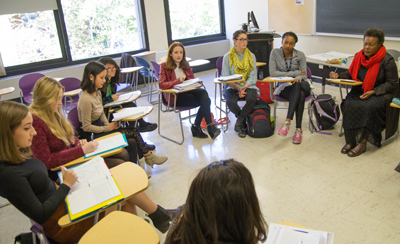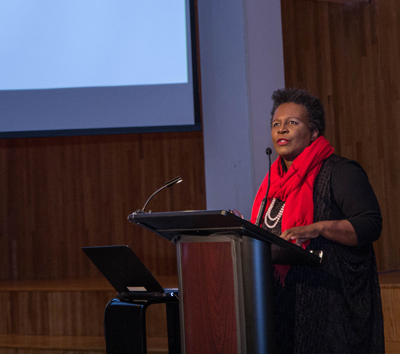
The Jamaican-American poet and playwright Claudia Rankine visited FIT on October 6 to give a public talk and reading, and speak with students about the writer’s craft in several poetry classes. Rankine is the author most recently of Citizen: An American Lyric (2014), a volume in which her essayistic verse is paired with works of fine art, such as paintings by Glenn Ligon and J.M.W. Turner, a Nick Cave “soundsuit,” and photographs. Because of its hybrid nature, the book was nominated for the National Book Critics Circle Award in two categories—Criticism and Poetry. It won the latter, as well as the PEN Center USA Award, and was nominated for several others. The book has caught on with the general public in a way few volumes of poetry do, and eager students filled the Katie Murphy Amphitheater for her talk, “The Creative Imagination and Race.”
Citizen is a stark, brooding affair on a grim topic—racism, both as it plays out in overt, violent ways (the text refers to Michael Brown and Trayvon Martin) and in more subtle “microaggressions” between people of color and white people who might even be close friends. One section of the book is devoted to the career of master tennis player Serena Williams. Rankine asks, “What does a victorious or defeated black woman’s body in a historically white space look like?” (Rankine, an unabashed fan of Williams, also has profiled the athlete for The New York Times.)
As it turns out, Rankine attended FIT as a teenager, taking a class for high school students on how to make an outfit. Wearing a dress of charcoal-grey burnout fabric under a striped blazer and a brilliant red scarf, the soft-spoken writer gave her work a relatable context for FIT students. The artist Nick Cave, for example, whose art appears in Citizen, began his career as a fashion designer, she said. Of her writing process, she said, “The thing about artists is that they have to do it.”
Rankine has said she disagrees with the notion that the imagination transcends the writer’s identity, and one student asked her to elaborate. Rankine said, “This idea that you are a product of the world and suddenly this imagination that you have comes in detached from everything else that you know, everything that has formed you, everything that you have read, everything that has determined everything else you have done, is as ridiculous as saying that whiteness equals normality. But it comes from the same place. It’s this notion that there is a place that is not touched by politics, race, misogyny, colonialism—and who says that but the dominant force, right?”
Another student wanted to know how she feels about being an American citizen herself. “I feel like my life is possible here in a way that’s not possible anywhere else,” she said. “How do I feel about being an American citizen? I embrace it. I signed up and I’ll keep coming back. That doesn’t mean I won’t sign up for the struggle to end injustice.”
The event was presented by FIT’s English and Communication Studies Department of the School of Liberal Arts, with support from the Office of Academic Affairs, the Diversity Council, and the Student Faculty Corporation.

